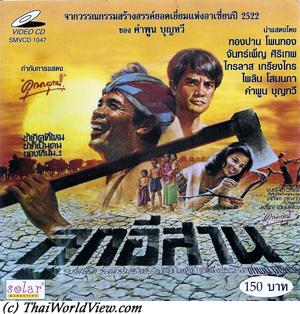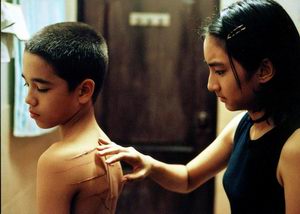I'm most disappointed in this year's nominees for best foreign film.
- As It Is in Heaven (Sweden)
- The Chorus (Les Choristes) (France)
- Downfall (Germany)
- The Sea Inside (Spain)
- Yesterday (South Africa)
No Hero nor House of the Flying Daggers. No Old Boy nor Spring Summer Fall Blah Blah Blah. No Nobody Knows nor Ghost in the Shell: Innocence (in fact, the animation selections this are horrid, except for The Incredibles) And no Tropical Malady.
The way the nominees are chosen is the big part of the problem. An article in the New York Sun highlights some of these. Each country picks a film and sends it to the Academy. So not only are there problems within the Academy, each country is susceptible to hang-ups, favoritism and graft when it comes to the "byzantine" system of submitting films for consideration. The Sun mentions Thailand:
Which films countries choose to submit tells a lot about how they want to be perceived by the rest of world. Thailand snubbed Tropical Malady - which won the Prix du Jury at Cannes - presumably because the film's gay content violated the government's recent order to cut down on the portrayals of homosexuals. Instead, they sent The Overture, a conventional story of Thailand's last great classical musician, Luang Pradith Phairao.
What if Tropical Malady had been sent instead of the overly commercial Overture? Well, judging from this year's choices, which eschew Asian cinema altogether, it probably wouldn't have been selected, though it would have been a better choice. It's difficult to really discern the entire list of films that are submitted each year, except for fragmented, anectdotal evidence. It's a process that needs more light shed on it.
The Sun offers the entire list of films submitted for Oscar's consideration, noting the The Overture will be shown in North American sometime in the summer of this year.
- Afghanistan - Earth and Ashes
- Argentina - A Lost Embrace
- Austria Antares
- Belgium - The Alzheimer Case
- Bosnia and Herzegovina - Days and Hours
- Brazil - Olga
- Bulgaria - Mila From Mars
- Canada - Far Side of the Moon
- Chile - Machuca
- China - House of Flying Daggers
- Croatia - Long Dark Night
- Czech Republic - Up and Down
- Denmark - The Five Obstructions
- Ecuador - Cronicas
- Egypt - I Love Cinema
- Estonia - Revolution of Pigs
- Finland - Producing Adults
- France - The Chorus
- Germany - Downfall
- Greece - A Touch of Spice
- Hungary - Kontroll
- Iceland - Cold Light
- India - Shwaas
- Iran - Turtles Can Fly
- Israel - Campfire
- Italy - The House Keys
- Japan - Nobody Knows
- Korea - Tae Guk Gi (Brotherhood of War)
- Macedonia - The Great Water
- Malaysia - A Legendary Love (The Princess of Mount Ledang)
- Mexico - Innocent Voices
- The Netherlands - Simon
- Norway - Hawaii Oslo
- Palestine - The Olive Harvest
- Philippines - Crying Ladies
- Poland - The Welts
- Portugal - The Miracle According to Salome
- Romania - Orient-Express
- Russia - Night Watch
- Serbia and Montenegro Goose Feather
- Slovenia - Beneath Her Window
- South Africa - Yesterday
- Spain - The Sea Inside
- Sweden - As It Is In Heaven
- Switzerland - Mein Name Ist Bach
- Taiwan - 20:30:40
- Thailand - The Overture
- Uruguay - Whisky
- Venezuela - Punto y Raya
(Cross-published at Rotten Tomatoes)

















